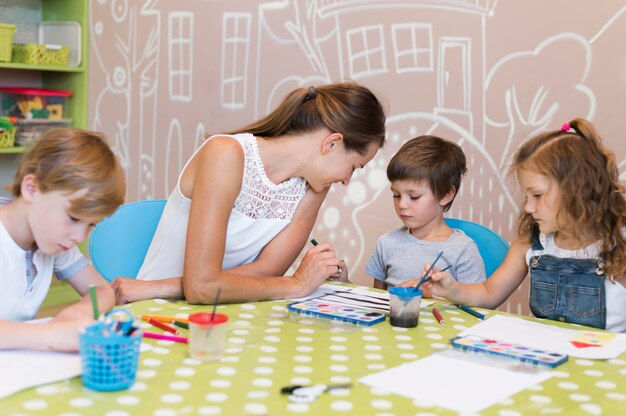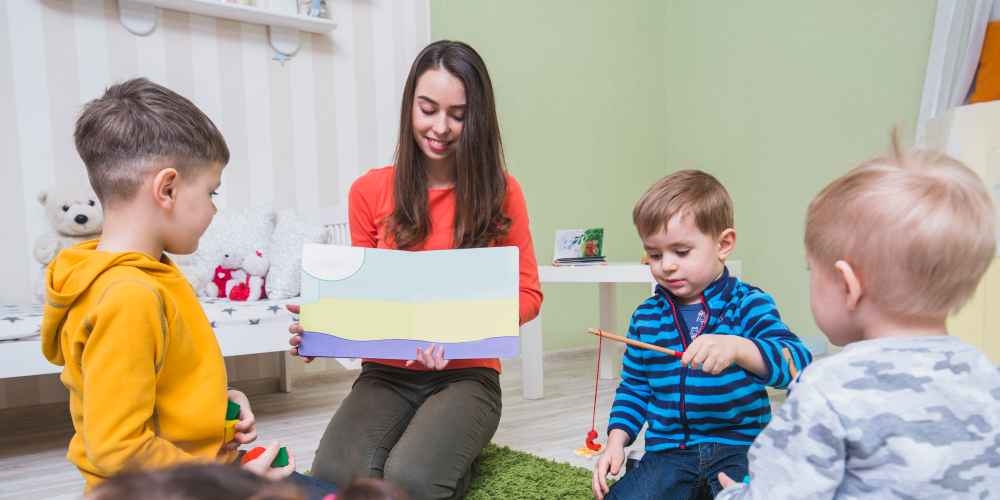Social-emotional learning (SEL) is a critical component of early childhood education, laying the foundation for emotional intelligence, self-awareness, and positive interpersonal relationships. Preschools play a pivotal role in nurturing the social-emotional development of young children. This article explores effective strategies that preschools can implement to promote social-emotional learning, creating a supportive environment where children can thrive emotionally and socially.
Fostering Positive Teacher-Child Relationships
Establishing positive relationships between teachers and children is foundational for social-emotional learning. Preschool educators can create a warm and responsive environment by actively engaging with each child, expressing empathy, and providing a secure attachment. Building strong connections with teachers fosters a sense of trust and emotional well-being in young children, forming the basis for healthy social interactions.
Incorporating Social-Emotional Curriculum
Preschools can integrate explicit social-emotional curriculum into their educational programs. This involves teaching specific skills related to emotional regulation, empathy, and effective communication. Through age-appropriate activities, stories, and discussions, children can learn to identify and express their emotions, understand the feelings of others, and develop effective interpersonal skills.
Teaching Conflict Resolution and Problem-Solving Skills
Preschools should actively teach conflict resolution and problem-solving skills to equip children with the tools to navigate social situations. Educators can guide children through conflicts, encouraging them to express their feelings, listen to others, and work collaboratively towards resolutions. Teaching problem-solving skills empowers children to address challenges independently and promotes a positive social environment.
Creating a Safe and Inclusive Environment
A safe and inclusive environment is crucial for social-emotional learning. Preschools can create spaces where children feel accepted, respected, and valued for who they are. Emphasizing inclusivity, celebrating diversity, and fostering a sense of belonging contribute to a positive social-emotional climate, promoting the well-being of every child.
Implementing Mindfulness and Relaxation Techniques
Introducing mindfulness and relaxation techniques into daily routines can enhance social-emotional learning. Simple activities such as deep breathing exercises, mindfulness games, or guided relaxation sessions help children develop self-regulation skills. By teaching children to manage stress and regulate their emotions, preschools contribute to the development of resilient and emotionally intelligent individuals.
Encouraging Social Play and Cooperative Activities
Preschools should prioritize social play and cooperative activities to foster positive social interactions. Group games, collaborative projects, and shared play experiences provide opportunities for children to practice cooperation, communication, and teamwork. Engaging in social play enhances interpersonal skills and promotes a sense of camaraderie among preschoolers.
Promoting Emotional Expression through Art and Creativity
Art and creative activities offer a platform for children to express their emotions. Preschools can incorporate art projects that encourage emotional expression, such as drawing or crafting activities related to feelings. Providing opportunities for children to share their creations and discuss their emotions promotes self-awareness and effective communication.
Involving Families in Social-Emotional Learning
Preschools should actively involve families in social-emotional learning initiatives. Collaborating with parents through workshops, newsletters, or family engagement events keeps families informed about the social-emotional development goals of the preschool. Consistent communication between educators and families creates a cohesive approach to supporting children's social-emotional well-being.

Related : What Makes a Preschool Environment Conducive to Early Learning?
Suggesting a Preschool: Prioritizing Social-Emotional Learning
When selecting a preschool for their child, parents should seek institutions that prioritize social-emotional learning through positive teacher-child relationships, social-emotional curriculum integration, conflict resolution teaching, creating a safe and inclusive environment, implementing mindfulness techniques, encouraging social play, promoting emotional expression through art, and involving families in the learning process. A preschool that emphasizes these strategies provides a nurturing environment for the holistic development of young children.
Montessori Shir-Hashirim Los Angeles
- 6047 Carlton Way, Los Angeles, CA 90028
- Highly rated for focused curriculum, excellent staff, and diverse extracurriculars
- Half day: $27,000 yearly, $9,000 quarterly
- Full day: $28,500 yearly, $9,500 quarterly
Shir-Hasirim Montessori school has two different locations. The main location is on Carlton Way in Los Angeles. This school teaches children between the ages of 2 and 6 and prepares them for some of the top Montessori elementary schools in the city. Specifically, they offer a primary program and a summer program for preschool children.
At Shir-Hashirim, they allow their students to grow and learn both individually and within the community of the school. Students are able to learn at their own pace when it comes to both practical life skills and subjects such as math and language.
Shir-Hashirim Montessori has a parent-and-me program that is best for the families who may enroll their child in the Montessori program.
Conclusion :
In conclusion, promoting social-emotional learning in preschools is essential for the well-rounded development of young children. By fostering positive relationships, incorporating social-emotional curriculum, teaching conflict resolution and problem-solving skills, creating a safe and inclusive environment, implementing mindfulness techniques, encouraging social play, promoting emotional expression through art, and involving families, preschools contribute to the emotional intelligence and social competence of their students. Prioritizing social-emotional learning sets the stage for a positive and supportive foundation that will benefit children throughout their educational journey and beyond.


